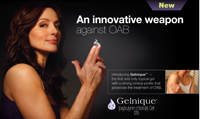Watson launched a campaign today for its overactive bladder (OAB) product Gelnique – the first topical gel indicated for OAB – featuring younger, active women.
The creative differs from other campaigns in the category, which tend to feature embarrassed men and women dashing toward the nearest bathroom. “Instead of focusing on the condition, we wanted to focus on the solution,” said Eric Pluckhorn, director of marketing at Watson Pharmaceuticals. New Jersey-based Core-Create is the AOR on Gelnique, with a “leading interactive company” handling digital components, said Pluckhorn.
Professional elements of the campaign targeting urologists and OB/GYNs launched today, with some direct-to-patient materials landing in doctors’ offices, according to Pluckhorn. Urolgists tend to be the top writers of OAB scripts. Samples of the product resemble makeup compacts, dubbed “sashays.” Given the relative size of Watson, primarily a generics manufacturer, the company will not send out reps to primary care physicians, and instead focus on telemarketing and various web channels to reach PCPs, said Henric Bjarke, Watson’s VP of marketing.
The consumer campaign will roll out in the next two months, though not through traditional DTC channels, such as magazines and television, said Pluckhorn. Instead, the campaign will feature “a lot of interactive components” online, with creative differing from the professional ads. Consumer creative will utilize sketches, said Pluckhorn. Additionally, patients visiting the website can use their zipcode to find doctors that write scripts for Gelnique, said Bjarke.
Overactive bladder has been called a closet disorder, and patients typically wait a while before seeing a doctor. Marketing research conducted by Watson found that OAB patients don’t typically view themselves as people getting older, but see OAB as an obstacle to overcome, said Pluckhorn. Gelnique (oxybutynin chloride) Gel 10% was approved by the FDA last January. As many as 33 million adults in the US suffer from OAB, and the market currently exceeds $1.8 billion annually, according to Gelnique’s website.







